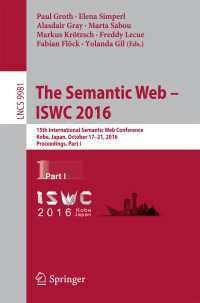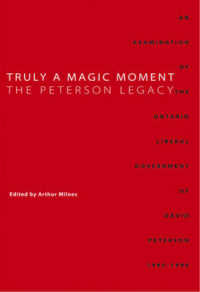- ホーム
- > 洋書
- > 英文書
- > Literary Criticism
Full Description
On college and university campuses across the United States, scholar-teachers and their students find themselves in conditions of both real threat and tremendous possibility. Building on the recent surge of interest in equitable pedagogy within the field of Shakespeare and Renaissance literary studies, Situating Shakespeare Pedagogy in U.S. Higher Education makes a case for anchoring our teaching in these institutional power dynamics that have historically contributed to systemic injustice and continue to affect our work on a daily basis. Each of the contributors to this collection speaks directly to the intersection between their own identities, the lived experiences of their students, and the particular qualities of the institutions where they teach including student demographics, curricular requirements, geographical location, and comparative levels of administrative support for implementing social justice approaches. From this perspective, they provide hope and practical guidance for scholar-educators who want to meet our students where they are.
Contents
List of Figures
Acknowledgements
Abstracts
Notes on Contributors
Introduction - Marissa Greenberg and Elizabeth Williamson
1. On Shakespeare, Anticolonial Pedagogy, and Being Just - Amrita Dhar
2. Deeply Engaged Protest: Social Justice Pedagogy and Shakespeare's "Monument" - Elisa Oh
3. Teaching Shakespeare at an Urban Public Community College: An Equity-Driven Approach - Victoria Muñoz
4. Teaching Shakespeare as a Killjoy Practice in a White Dominant Institution - Mary Janell Metzger
5. Shakespeare and Environmental Justice: Collaborative Eco-Theater in Yosemite National Park and the San Joaquin Valley - Katherine Steele Brokaw
6. Where Curriculum Meets Community: Teaching Borderlands Shakespeare in San Antonio - Katherine Gillen and Kathryn Vomero Santos
7. Dressing to Transgress: Aesthetic Matching, Historical Costumers of Color, and the Restorying of Institutional Spaces - Penelope Geng
8. Shakespeare in a Catholic University: (Re)creating Knowledge in a Divided Landscape - Kirsten N. Mendoza
9. Shakespeare's Mixed Stock: Biracial Affect in the Field - Roya Biggie and Perry Guevara
10. Who Shot Romeo? And How Can We Stop the Bleeding?: Urban Shakespeare, White People, and Education Beyond the Neoliberal Nightmare - Eric L. De Barros
Afterword - Wendy Beth Hyman
Bibliography
Index








